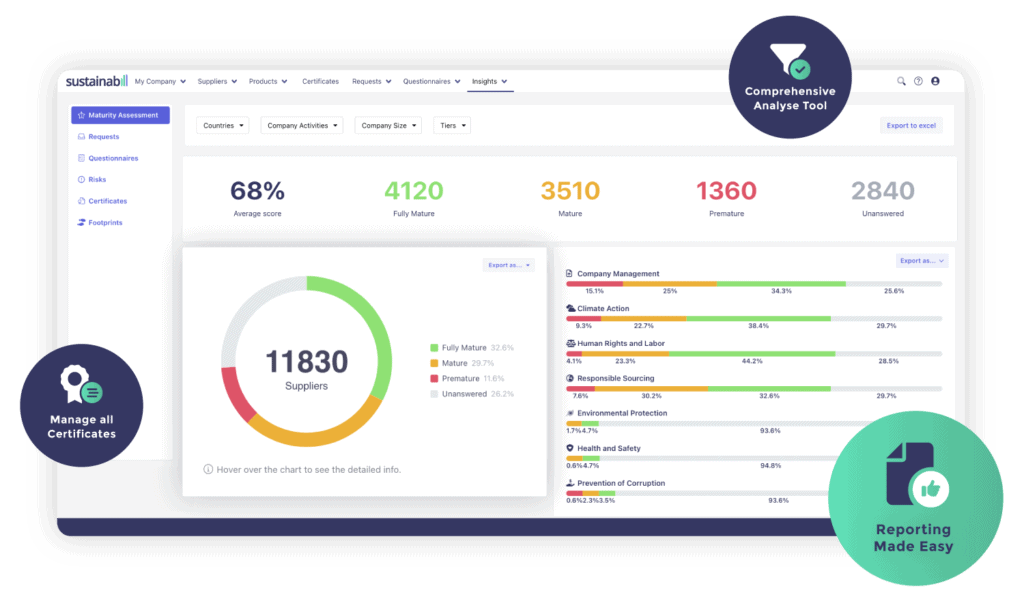With sustainabill, we have found a solution to engage with suppliers on the right issues and bring about change in the supply chain.
Head of Strategic Purchasing
From January 2024, the directive will affect all large European companies as well as companies based outside Europe with a turnover of more than €150 million in the EU. SMEs will be affected gradually from 2025. In total, around 50,000 companies in Europe are impacted by the directive.
In addition to detailed information on the company’s own business model and corporate strategy, the CSRD requires additional information on potential risks along the supply chain and measures taken in this regard.
Companies affected by the CSRD are required to publish their sustainability reports in a separate section of the management report no later than four months after the end of the financial year. The report must also be externally reviewed prior to publication.
The existing CSRD standardizes sustainability reporting and introduces mandatory European reporting standards (ESRS), which have been aligned with the Sustainable Finance Disclosure Regulation (SFDR) and the EU taxonomy. Companies must add a non-financial statement to their management report. The CSRD embeds the concept of double materiality. This means that companies must not only include sustainability risks that affect their economic performance in their reporting, but also risks that also have a negative impact on people and the environment. Accordingly, detailed information on sustainability targets and key figures must be reported.
With the CSRD, the topic of sustainability in the supply chain becomes even more relevant, as companies would now also have to report resiliently on CO2 emissions as well as sustainability risks in the supply chain. With sustainabill, you can holistically cover all sustainability aspects in your supply chain. Collect the required data in the supply chain with minimal effort, monitor your suppliers and receive the required reporting key figures for GRI and CSRD at the push of a button.
The CSRD requires a report on the performance of risk analyses and the implementation of preventive and remedial measures. With sustainabill, you can implement risk analyses in a holistic and resource-efficient way – starting with our risk check as a basis for the subsequent risk analysis and ending with the derivation of preventive and remedial measures. The approach is 100% compliant with other due diligence requirements such as the German Supply Chain Act or the UK Modern Slavery Act.

The sustainabill key figures can be seamlessly integrated into the reporting solution of our partner Verso. Through Verso, sustainability data can be collected and managed across the entire company and the complete GRI and CSRD report can be generated with just a few clicks.

The sustainabill cloud platform enables the efficient implementation of sustainability requirements such as those imposed by the European Supply Chain Act and the holistic management of ESG risks.
With the sustainabill cloud platform, you achieve an automated evaluation of your supplier data for a fast and efficient implementation of current and future regulatory requirements.
The compliance of the sustainabill cloud platform with the German Supply Chain Act was audited by the renowned law firm Taylor Wessing.
Based in Cologne, hosting on the Telekom Cloud in Germany, highest data security and full control over your own data for you and your suppliers.
Schedule a free initial consultation in which we will discuss your individual situation and show you what added value our solution can offer you. We will contact you shortly with a proposed meeting date.